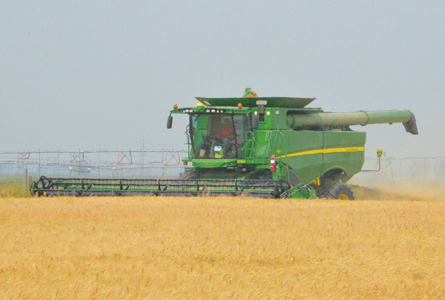Current Temperature
Dryland cultivation concerns raised
Posted on January 9, 2019 by Taber Times TIMES FILE PHOTO
TIMES FILE PHOTOBy Cole Parkinson
Taber Times
cparkinson@tabertimes.com
As part of council looked over finance committee recommendations, some councillors had concerns over one of the recommended motions around dryland cultivation.
The proposed motion reads as ‘motion to recommend to council that a business case be undertaken to determine the total costs related to converting the dryland cultivation farmland outlined in the December 3 memo to irrigation including viability, infrastructure costs, etc.’
During council’s regular meeting on December 11, councillors had a chance to raise their concerns around the intent of the motion.
“I’ve had some phone calls about this already and they are getting a little worried considering now County of Vulcan is also trying to take lease back from grazing associations and sell that land. Taking leases away that have always been a perpetual lease, I don’t think is right. I don’t think we should be changing the way we have been doing it. It would be different if some of this land was already given up. I don’t want to see my ratepayers lose any land or any farming,” said Coun. Leavitt Howg.
Coun. Jennifer Crowson also stated she viewed it the same as Councillor Howg, though others on council didn’t take it the same way.
“Personally, I didn’t think the intent was to take leases away, it was to investigate whether the existing leaseholders were interested in converting their leases to irrigation,” added Reeve Merrill Harris.
Coun. Brian Brewin also felt the motion was intended to investigate irrigation and not take away leases.
With a bit of confusion around the intent of the motion, M.D. director of lands and leases Brian Peers was brought in to explain.
“What is our version of the lease? Is it after two more years of the lease and then if they want to keep farming after but it is still dryland but we want to do irrigation. What is considered taking away a lease because it has always been a perpetual lease? Are you going to take it away from them after the two-year lease is done or is it if they can keep farming it as dryland? That is the biggest question here,” asked Howg.
Peers explained the process to explore irrigation on dryland was positive so far after doing some consultations with affected landowners.
While not everyone he had talked to was in favour, a large portion did show some sort of interest in moving forward.
“I think there were six leaseholders that were affected and we did contact all of them. Without a lot of detail on our end of what that might look like or how it would be structured, most of them were fairly positive of the idea of doing that,” stated Peers.
He also stated they were looking at water rates, availability of water through the irrigation districts and talking to Fortis as part of the process.
A motion was made that a business case be undertaken to determine the total costs related to converting the dryland cultivation farmland outlined in the December 3 memo to irrigation including viability, infrastructure costs, etc. and was passed by a 4-3 vote with opposing votes coming from Councillors Howg, Crowson and Murray Reynolds.
Leave a Reply
You must be logged in to post a comment.



